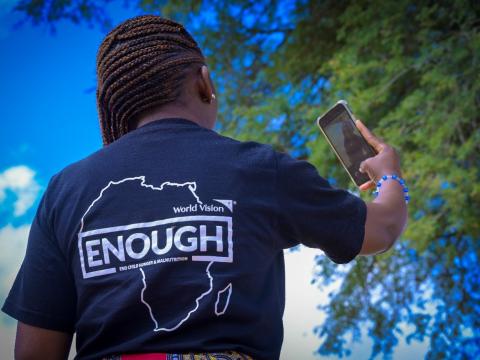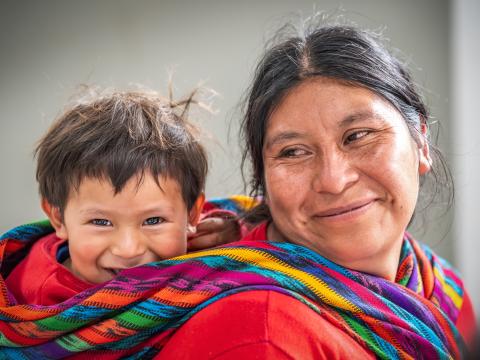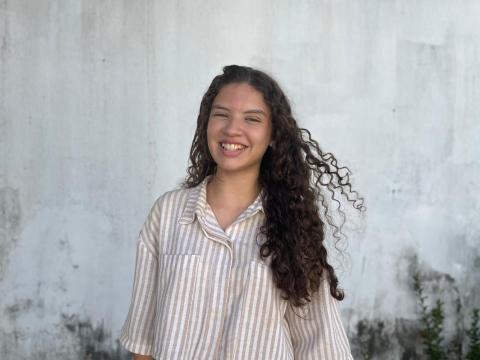Measuring the Immeasurable – Insights from Albania
Dr. Eljona Boce Elmazi, National Director for World Vision Albania shares about World Vision’s new research measures the immeasurable: love of God and neighbour. In Albania, this research led to a stronger understanding of how children grow in hope and purpose and the impact children have on our programmatic approaches.
Loving Relationships Grow Hope
Love, we believe, is the foundation of children having “fullness of life”. In every story I know personally of a child thriving and becoming an accomplished adult there is at least one person who cared for them, noticed them, saw them, and encouraged them. That is the story of so many children in Albania. I think of: Oriana, Aldi, Igli, Xhuana, Antonio, Xhensuara, Igli, and many more who told us things like:
“When I’m in a difficult situation, my parents are always by my side. They give me love to continue, so I don’t stop, to keep going forward.”
Yes, my family, for example, has supported me a lot in the things I wanted to do, to achieve, and I have achieved thanks to them, they have made me feel good in difficult moments when I didn’t have, I mean, self-esteem in some cases… Maybe… I thought I wasn’t capable of doing some things, and they helped me prove the opposite.
Children’s well-being and ultimately their flourishing increases when they are genuinely loved. Love grows hope in them. Yet the dimensions of well-being that are emotional, relational, and spiritual are often overlooked in traditional development metrics. Some may argue that these dimensions of well-being are immeasurable. At World Vision we are working to fix that. The God’s Love Rooted in Hope Research (Hope & Love Measure) is designed specifically to measure the immeasurable.
Measuring the Immeasurable
Developed from interviews with 658 children across eight countries, this innovative tool captures how God’s love shown through relationships, shapes a child’s ability to flourish. It provides a practical, evidence-based way to assess what truly matters to children. The measure is adaptable across cultures and contexts and offers a new lens for understanding both child well-being and the inner world of children whose voices shaped what we now call the six signs of hope: Compassion, Purpose, Joy, Wisdom, Resilience, and Personal Faith.
World Vision Albania was one of the first offices to pilot this measurement in communities. What was incredibly exciting was that this research started as an exercise in having our staff go and listen to children. In the children’s responses, we heard how love from the people around them gave them hope and purpose. Love strengthened their confidence, their motivation, and ultimately their sense of direction, and their hope.
Purpose was a key sign of hope that came out of the research in Albania, and we learned that purpose in children does not start with goals and instructions or with the idea of “let’s have a project.” It begins with a sense of belonging and the relationships we build together, where children feel loved. Every child who is now a university student, working, or running a startup, or serving in their community has had that type of support from at least one adult in their life. Conversely, children who lack these relationships struggle. We have seen children in various contexts, including very isolated ones, constrained in their ability to develop purpose, confidence, and motivation. We know that at the root of this is relational poverty.
Our approach to sponsorship allows us to remain present in the lives of children for a significant part of their childhood. Not only have we heard that relationships are vital from children directly, but we’ve witnessed the transformational nature of establishing strong, long-term relationships through our long-term presence in communities. This new measurement now allows us to quantify what that means and better establish best practice that enables children to flourish.
Children inspire purpose in one another
Purpose does not only develop from the love and care of a parent, caregiver, or World Vision staff. When children are loved, they begin to love and inspire purpose in one another. I have seen it constantly and so have my colleagues. In the research, one child said,
“My friend defends me when I am teased—in other words, when I’m bullied—and that gives me courage.”
Purpose spreads. When one child acts with kindness, others mirror that behaviour. That is why we design our programs in groups: youth clubs, creative projects, community service projects. Purpose is contagious when it is lived together. It is community hope in motion. It is one of our brand statements: bold hope in action.
Children themselves lead peer initiatives. In Albania, children reached eight times more youth through their community projects, addressing important issues like protection from violence and bullying, mental health, environment protection and more. These are all ways we see children inspiring purpose in one another. Not only that, but we heard children saying that they felt their purpose was to continue doing that throughout their life:
“I want to be a girl who supports children. For example, if I don’t become a psychologist, I want to become a good teacher for children because I have very good relationships with children. They love me, and I give them a lot of love. Everyone tells me, ‘When you grow up, I believe you’ll become a teacher.’ Okay, it’s a bit amusing when they say it, a bit funny, but seriously, I want to open a place or start something—not a business, but something—I don’t know what it’s called, where we help children.”
Conversations like this shaped the research. What we set out to do became a lesson in listening and deepening our understanding of children’s perspectives. For the staff conducting the interviews, it was an emotional experience. It moved beyond being a survey for research and became a transformational process that reminded us of how important it is to co-create our programs that are for children, with children.
We set out to measure the immeasurable – the experience of God’s love. Through the voices children and what they taught us about the six signs of hope we’ve discovered that we can measure what happens when children experience love. We’ve learned that love is not only the source of hope, it’s the foundation of flourishing. And now, with the Hope and Love Measure, we can capture these signs of transformation and use them to design programs that help every child thrive emotionally, relationally, and spiritually. Because when love grows, hope follows, and hope changes everything.
Learn more about The God’s Love Rooted in Hope Research (Hope & Love Measure).
Dr. Eljona Boce Elmazi is the National Director for World Vision Albania. Dr. Elmazi holds a PHD in International Family and Community Studies from Clemson University and has 25 years of experience working in education, social inclusion, and sustainable development. She has served for the last 10 years at World Vision working in both programmatic and leadership positions impacting the lives of children across Albania.


